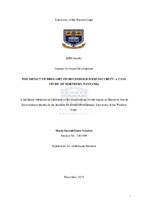| dc.contributor.advisor | Karriem, Abdulrazak | |
| dc.contributor.author | Ndzelen, Maria Goretti Diane | |
| dc.date.accessioned | 2016-05-26T10:47:53Z | |
| dc.date.available | 2016-05-26T10:47:53Z | |
| dc.date.issued | 2015 | |
| dc.identifier.uri | http://hdl.handle.net/11394/4986 | |
| dc.description | Magister Artium (Development Studies) - MA(DVS) | en_US |
| dc.description.abstract | With changes in climatic conditions being increasingly noticed around the world in the past 2 decades, drought has been identified as one of the main causes of food insecurity. Given the inseparable nature of food security and poverty, it has been impossible for Africa to attain the poverty reduction Millennium Development Goal as most of the continent still suffers food insecurity. Impacts of the drought described as one of the worst droughts which occurred in West an East Africa between 2009-2011, are still felt in some parts of Kenya, Ethiopia, Somalia, Djibouti and parts of Northern Tanzania close to Kenya. With almost 70% of sub- Saharan Africa’s population involved in agriculture, the occurrence of drought not only causes failure in food production but also negatively impacts food security and increases poverty. Understanding the impacts of drought on household food security is important for reducing household’s risk of poverty. Following this the study proposes policies for reducing the impact of drought on food security and other policies that can ensure complete eradication of food insecurity. | en_US |
| dc.language.iso | en | en_US |
| dc.publisher | University of the Western Cape | en_US |
| dc.subject | Climatic conditions | en_US |
| dc.subject | Northern Tanzania | en_US |
| dc.subject | Food security | en_US |
| dc.subject | Food insecurity | en_US |
| dc.subject | Poverty | en_US |
| dc.subject | Drought | en_US |
| dc.subject | Households | en_US |
| dc.title | The impact of drought on household food security : a case study of Northern Tanzania | en_US |
| dc.type | Thesis | en_US |
| dc.rights.holder | University of the Western Cape | en_US |

